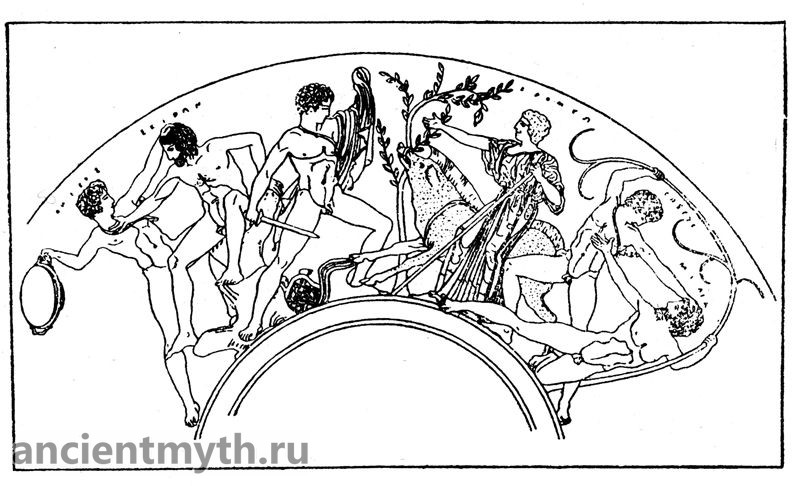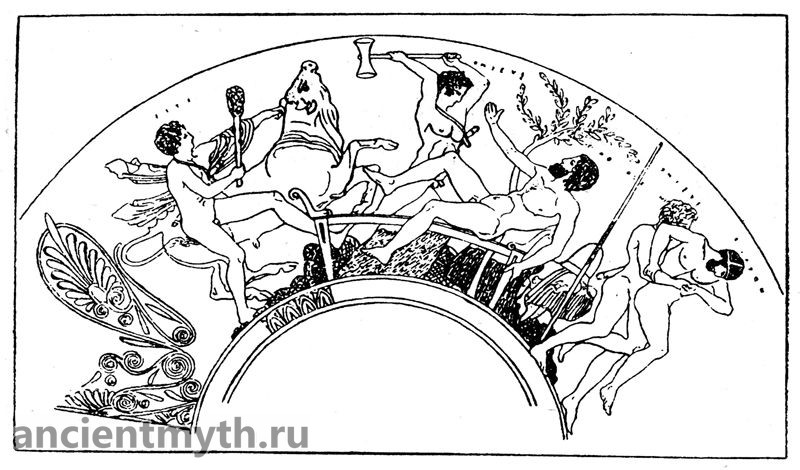The exploits of Theseus on the way to Athens
When Efra saw that her son surpassed all his peers in strength, she led him to a rock, under which lay a sword and sandals Aegea, and said:
- My son, here under this rock lie the sword and sandals of your father, the lord of Athens, Aegeus. Move the rock and take the sword and sandals, they will be the sign by which your father will recognize you.
Pushed Theseus took the rock and easily moved it from its place, he took his sword and sandals, said goodbye to his mother and grandfather and set off on a long journey to Athens. Theseus did not heed the requests of his mother and grandfather to choose a safer sea route; he decided to go to Athens by land, through the Isthmus.
This path was difficult. Theseus had to overcome many dangers during the journey, he had to perform many feats. Already on the border of the Troisena and Epidaurus hero met a giant Periphet, the son of God Hephaestus. Like the god Hephaestus himself, his son, the giant Periphet, was lame, but his hands were mighty and his body was huge. The Periphet was formidable. Not a single wanderer passed through the mountains in which Periphet lived, all of them were killed by a giant with his iron club, but Theseus easily defeated Periphet. This was the hero's first feat, and as a sign of his victory, he took the iron club of the Periphet he had killed.

From left to right: Theseus and Skyron, Theseus kills the Cromion pig, Theseus and Sinides.
(Drawing on a vase)
Theseus went on all the way to the Isthmus without being exposed to dangers. On Isthmus, in a pine grove dedicated to To Poseidon, Theseus met the flexor of the pines Sinida. He was a ferocious robber. He put all travelers to a terrible death. Bending two pines so that they touched the tops, Sinid tied the unfortunate traveler to the pines and let them go. The pines straightened with terrible force and tore the body of the unfortunate. Theseus avenged all those whom Sinides had destroyed. He tied up the robber, bent two huge pine trees with his mighty hands, tied Sinida to them and let the pine trees go. The ferocious robber died the very death with which he destroyed innocent travelers. The way through the Isthmus was now clear. Later, in memory of his victory, Theseus established at the place where he defeated Sinida, Isthmian games.
Theseus' further path went through Cromion. The whole area around was devastated by a huge wild pig spawned by Typhon and Snide. The inhabitants of Cromion begged the young hero to rid them of this monster. Theseus overtook the pig and struck it with his sword.
Theseus went on. In the most dangerous place of Isthmus, at the borders Megara, where steep cliffs rose high to the sky, at the foot of which foamy sea waves were menacingly noisy, Theseus met a new danger. On the very edge of the cliff lived a robber Skiron. He made everyone who passed by wash his feet. As soon as the traveler bent down to wash Skiron's feet, the cruel robber threw the unfortunate man off the cliff with a strong kick into the stormy waves of the sea, where he crashed to death on sharp stones sticking out of the water, and his body was devoured by a monstrous turtle. Theseus, when Skyron wanted to push him off, grabbed the robber by the leg and threw him into the sea.

From left to right: Theseus and the Marathon bull, Theseus and Procrustes, Theseus and Kerkyon.
(Drawing on a vase)
Not far from Eleusis, Theseus had to fight with Kerkion, just as Hercules had to fight with Anthem. The mighty Kerkyon destroyed many, but Theseus, clasping Kerkyon with his hands, squeezed him as in an iron vice, and killed him. This freed Theseus and Kerkyon's daughter, Alopa, Theseus gave the power over the country of Kerkyon to the son of Alopa and Poseidon, Hippotoont.
After passing Eleusis and approaching the valley of the Kefisa River in Attica, Theseus came to the robber Damastus, who was usually called Procrustes (the stretcher). This robber came up with a particularly painful torture for everyone who came to him. Procrustes had a bed, on which he forced those who fell into his hands to lie down. If the bed was too long, Procrustes pulled the unfortunate until the victim's feet touched the edge of the bed. If the bed was short, then Procrustes cut off the unfortunate man's legs. Theseus threw Procrustes himself on the bed, but the bed, of course, turned out to be too short for the giant Procrustes, and Theseus killed him the way the villain killed travelers.
This was Theseus' last feat on the way to Athens. Theseus did not want to come to Athens stained with the spilled blood of Sinida, Skyron, Procrustes and others; he asked fitalids to clean it at the altar with special religious ceremonies Zeus-Malikhiya. The fitalids of the young hero welcomed him cordially as a guest. They fulfilled his request and cleansed him from the filth of spilled blood. Now Theseus could go to Athens, to his father Aegeus.